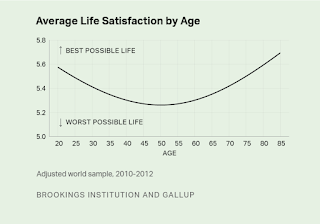Arthur C. Brooks
The Atlantic
Originally posted 23MAR 23
Here are some excerpts:
“Happiness in intelligent people is the rarest thing I know,” an unnamed character casually remarks in Ernest Hemingway’s novel The Garden of Eden. You might say that this is a corollary of the much more famous “Ignorance is bliss.”
The latter recalls phenomena such as:
- the Dunning-Kruger effect—in which people lacking skills and knowledge in a particular area innocently underestimate their own incompetence—and
- the illusion of explanatory depth, which can prompt autodidacts on social media to excitedly present complex scientific phenomena, thinking they understand them in far greater depth than they really do.
The Hemingway hypothesis, however, is less straightforward. I can think of a lot of unhappy intellectuals, to be sure. But is intelligence per se their problem? Happiness scholars have studied this question, and the answer is—as in so many parts of life—it depends. The gifts you possess can lift you up or pull you down; it all depends on how you use them. Many people see intelligence as a way to get ahead of others. But to get happier, we need to do the opposite.
You might assume that intelligence—whether it be the conventional IQ kind, emotional intelligence, musical talent, or some other dimension along which a person can excel—raises happiness, all else being equal. After all, people with higher cognitive ability should logically have more exciting life opportunities than others. They should also acquire more resources with which to enhance their well-being.
In general, however, there is no correlation between general intelligence and life satisfaction at the individual level. That principle does mask a few wrinkles. In 2022, researchers at Weill Cornell Medicine and Fordham University looked at the association between well-being and various building blocks of neurocognitive ability: memory, processing speed, reasoning, spatial visualization, and vocabulary. The only components of intelligence that they found to be positively related to happiness were spatial visualization, memory, and processing speed—but those relationships were fleeting and age-related.
More interesting, the researchers also found a strongly negative association between happiness and vocabulary. To explain this, they offered a hypothesis: People with a large vocabulary “self-select more challenging environments, and as a result may encounter more daily stressors and reduced positive affect.” In other words, loquacious logophiles might have byzantine lives and find themselves in manifold precarious situations that lower their jouissance. (They talk themselves into misery.)
(cut)
I think there is a clear reason that something as valuable as intelligence, especially manifested in one’s ability to communicate, doesn’t necessarily lead to a higher quality of life.
One of life’s cruelest mysteries is why we are impelled to pursue rewards that bring success, but not happiness. Mother Nature drives us toward the four goals of money, power, pleasure, and prestige with the promise that these rewards will bring happiness. In truth, the correlation might be positive, but the causation is probably reversed: Happier people naturally get these rewards. But seek them for their own sake, for your own gain, and happiness will likely fall. Accordingly, if you aspire to use your cleverness for personal benefit—for the praise and admiration of others, or an advantage in work and dating—woe be unto you.
The smarter you are, the better equipped you should be to understand that well-being comes from faith, family, friendship, and work that serves others. Your intelligence is more likely to bring you happiness if you put it to use by chasing better ways to love and serve others, rather than elbowing others aside and hoarding worldly rewards.
In some ways, you can think of intelligence as a resource just like money or power. We know how to make the latter two sources of joy: Share them with others, and use them as a force for good in the world. To make smarts a fount of happiness, too, we can follow the same guide. Here are a couple of tangible proposals.












